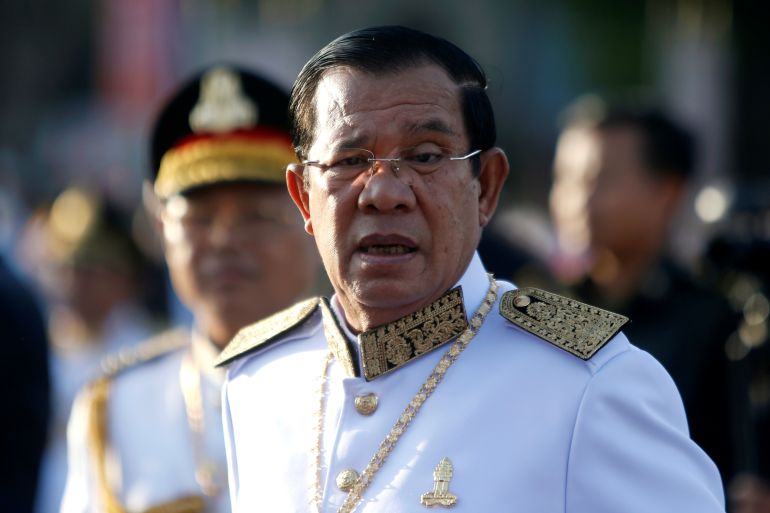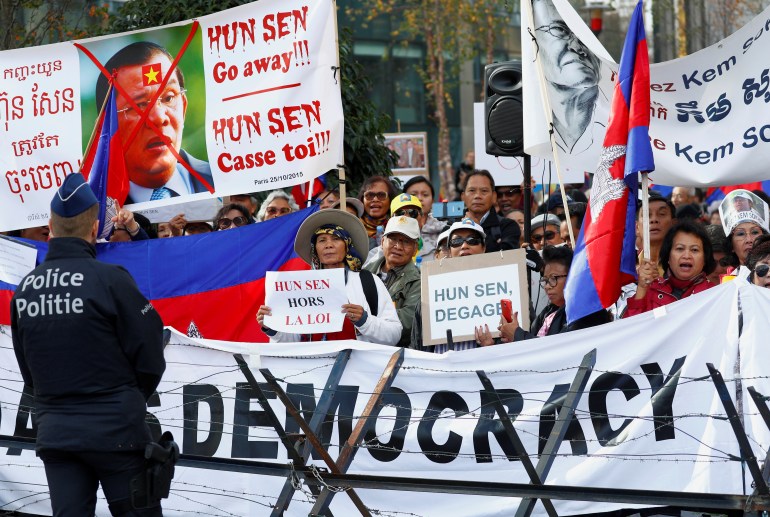Cambodia placed on watchlist of ‘repressive’ states: CIVICUS
Cambodia’s longtime ruler Hun Sen has ‘overseen a systematic assault on fundamental freedoms’, report states.

Cambodia has experienced a worrying decline in basic freedoms as authorities use the legal system to restrict and criminalise human rights work, youth activism, trade unions, independent journalism, opposition politicians and other voices critical of Prime Minister Hun Sen’s government, a leading rights group has warned.
To further strengthen his almost 40-year iron grip on power, Hun Sen recently used the COVID-19 pandemic to implement a state of emergency law that further restricted the fundamental freedoms of Cambodian citizens, said CIVICUS – a global alliance of civil society organisations tracking fundamental freedoms worldwide.
Keep reading
list of 4 itemsVideo goes viral after Cambodia tries to silence popular rapper
Cambodia hotel-casino fire kills 26, electrical fault blamed
Misreading the room: Why Hun Sen is failing on Myanmar
“The misuse of the criminal justice system to harass and prosecute human rights defenders, unionists and journalists and the shutting down of media outlets highlights the democratic regression in Cambodia,” CIVICUS said in a Cambodia country report released on Thursday.
Hun Sen, the organisation said, had “overseen a systematic assault on fundamental freedoms in Cambodia over the past decade” and the country was now on a watch list of “repressive” countries joining, among others, Iran, Sudan, Zimbabwe, and Peru.
“Cambodian human rights defenders and activists continue to face repression,” said CIVICUS, which tracks civic freedoms across 197 countries and territories, and “press freedom continues to be at risk in Cambodia with radio stations and newspapers silenced, newsrooms purged and journalists prosecuted, leaving the independent media sector devastated”.

On Monday, Hun Sen ordered the closure of one of the country’s last remaining independent news outlets, Voice of Democracy (VOD), after it reported on a story involving his son and heir apparent Hun Manet. Hun Sen said the story on the provision of aid to earthquake-hit Turkey was misreported and had demanded an apology. Despite receiving an apology, he ordered VOD shut down anyway.
European Union embassies in Cambodia expressed their concern at Hun Sen’s closure of VOD, as did Australia, Canada, the United Kingdom and United States.
We are deeply concerned by the closure
of VOD @VOD_English and @VODKhmer – independent and professional media. We respectfully urge a reassessment of the decision since a free and independent press allows for many voices in a democratic Cambodia 🇰🇭— Canada in Cambodia (@CanadaCambodia) February 14, 2023
The decision to close the news organisation was “particularly troubling due to the chilling impact it will have on freedom of expression and on access to information ahead of the national elections in July”, US State Department spokesperson Ned Price said on Monday.
Responding to international criticism of his closure of VOD, Hun Sen on Tuesday warned foreigners to not interfere in Cambodia’s internal affairs.
Cambodia’s foreign ministry weighed in, saying the closure of a “rule-breaking” news organisation did “not merit any worry at all” and accused foreign diplomats who had expressed concern as “politically-driven, prejudiced and biased”.
Josef Benedict, Asia-Pacific researcher for CIVICUS, said the misuse of the criminal justice system and the “systematic attack on civic space in the country” contravened Cambodia’s international human rights obligations.
With more than 50 political prisoners in jail, and more than 150 opposition party leaders and supporters the target of politically-motivated prosecutions, CIVICUS said there are “serious concerns around the escalating climate of repression against the opposition” ahead of Cambodia’s national elections in July.
In a list of recommendations accompanying the report, the organisation called on the Cambodian government to drop all charges against those exercising their constitutional rights to freedom of assembly, association and expression, and to end the mass trials, arbitrary arrest, violence, harassment and intimidation directed at the country’s political opposition.
Journalists also needed to be protected from intimidation and be allowed to “work freely without fear of retaliation for expressing critical opinions or exposing government abuses”, CIVICUS said.
CIVICUS also called on the international community – through diplomatic missions and representatives in Cambodia – to press the Cambodian government to protect the fundamental freedoms of its citizens and to make public international concerns regarding the deteriorating situation in Cambodia – including raising concerns at the United Nations Human Rights Council and “initiate stronger Council action as required”.